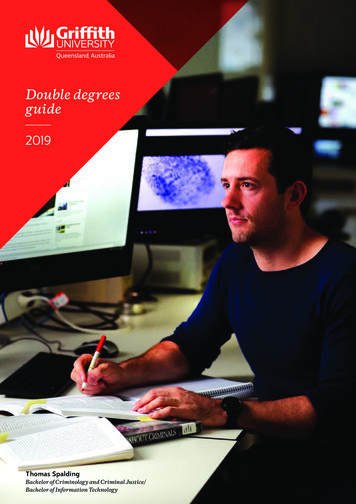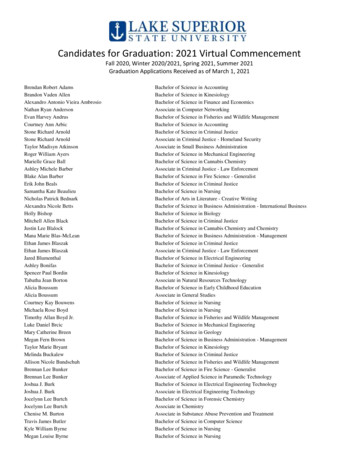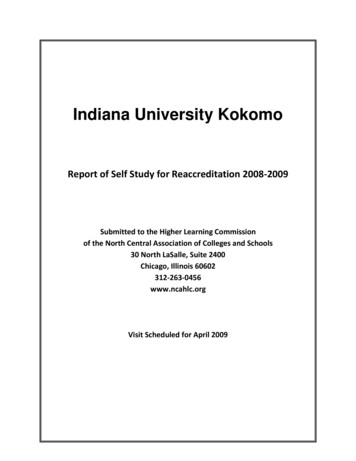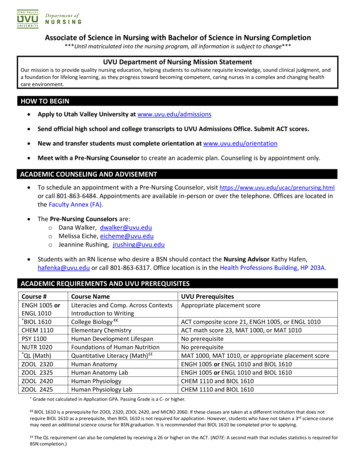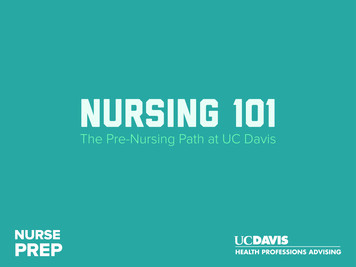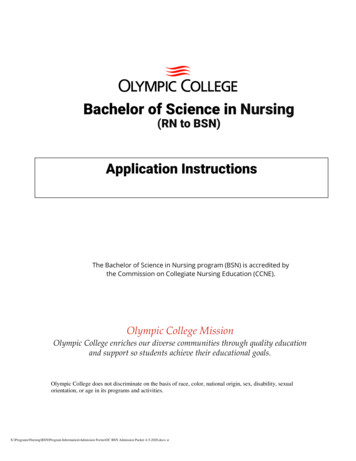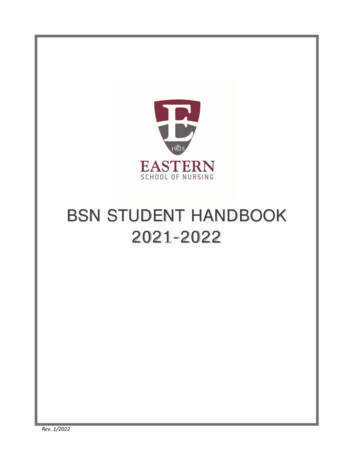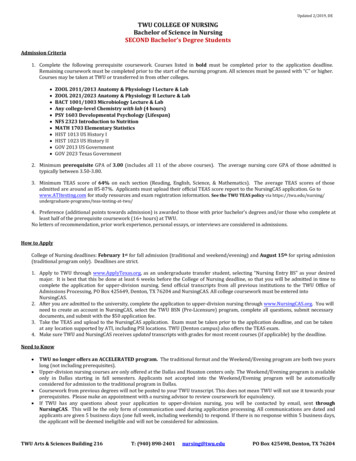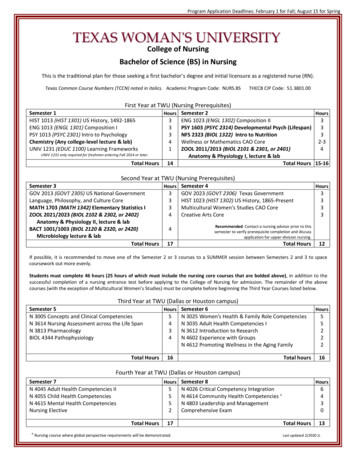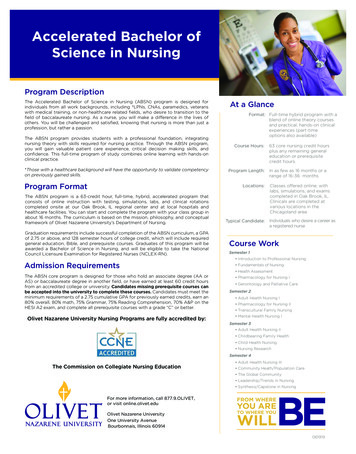
Transcription
SCHOOL OF NURSING AND ALLIED HEALTHBachelor of Science in Nursing (BSN)Student Handbook2022-2023Address: MCHC 700 East First AvenueMailing Address: 1906 College Heights Blvd. #11036Bowling Green, KY y 1, 20221
TABLE OF CONTENTSBACCALAUREATE PROGRAM - PROGRAM SPECIFIC INFORMATION . 5Baccalaureate (BSN) Education . 5Organizing Framework . 5Brief History of the BSN Program at WKU . 5BSN Program Outcomes . 6Accreditation . 6Program Approval/Licensure . 6CURRICULUM AND ACADEMIC PROGRESSION . 8Upper Division Nursing Course Sequence (Officially Admitted) . 8Health Education System, Inc. (HESI) . 9Academic Advisement . 9Communication Via the List Serve . 9BSN Grading Policy . 10Readmission to the BSN Nursing Program . 10Program Completion . 11Promotion . 11Retention . 11Withdrawal and Audit . 11Withdrawal from the BSN Nursing Program . 12Military . 12Military Withdrawal . 12Academic Integrity . 12TESTING POLICIES. 13Exam Policies . 13Extended Testing Progression Policy for ESL Students . 14Procedures Related to the Use of Exam Devices . 15Student Absence from Examinations/Tests. 16Final Grades and Time of Posting . 16Meeting with the Faculty, Program Coordinator or Director of the School of Nursing . 16ADA Accommodation Statement and Accommodations. 162
CLASSROOM AND CLINICAL POLICIES . 17Classroom Policies for Face-to-Face and Virtual Settings. 17Laboratory Rules . 18Clinical/Simulation/Lab Attendance . 18Personal Illness, Emergency, and Extenuating Circumstances . 19Professional Standards for Clinical, Simulation, and Lab . 20BSN Dress Code Policy . 20Dress Code for Obtaining Clinical Assignments or Visiting Agencies . 21Acceptance of Gifts . 21STUDENT PROFESSIONAL CONDUCT . 22BSN Student Representative Guidelines . 22Student Membership in Nursing Organizations . 22Student Employment . 23National Student Nurses’ Association, Inc. Code of Academic and Clinical Conduct . 23Code of Academic and Clinical Conduct . 23HIPAA Policy . 24Confidentiality Policy . 24Professional Conduct of Nursing Students . 25Disrespectful or Inappropriate Behavior . 25Dismissal for Non-Academic Reasons – Professional Misconduct . 26Disciplinary Action for Professional Misconduct . 27Academic Dishonesty. 27Plagiarism . 27Drug and Alcohol Use . 28Drug Screen Procedures Post-Admission to the Nursing Program . 29Social Media. 30APPENDIX A . 33PRE-ADMISSION CURRICULUM . 33RECOMMENDED SEQUENCE OF COURSES FOR BSN PRE-NURSING STUDENTS . 34GNA . 35Undergraduate Nursing English as a Second Language (ESL) Proficiency Policy . 37Policy for Continuing Nursing Students . 373
Drug Screen Procedures Pre-Admission to the Nursing Program . 38Criminal Background Check . 38APPENDIX B . 39School of Nursing & Allied Health Core Performance Standards . 39Core Performance Standards . 40APPENDIX C . 42Professional Standards Evaluation Tool . 42Requesting Reasonable Accommodations . 44Testing Accommodations Policy and Procedure . 44School of Nursing & Allied Health Testing Accommodations for Students . 44SARC Testing Accommodations Procedure . 45ESL Application for Extended Testing . 47APPENDIX D . 48Health and Safety Policies. 48Bloodborne Pathogens Policy . 49Latex Sensitivity Policy . 50APPENDIX E . 51BSN Portfolio Requirement . 51APPENDIX F . 52Letter of Recommendation Guidelines . 52APPENDIX G . 53Delegation of Clinical Learning Activities to Nursing Staff. 53Learning Agreement Form for Advanced Nursing Skills . 55APPENDIX H . 56BSN Program Awards . 56APPENDIX I . 57FICTION CONTRACT AND CONFIDENTIALITY AGREEMENT . 57APPENDIX J . 59WKU Nursing Students Clinical Release Form . 59APPENDIX K . 61Assumption of Rick. 61SPECIAL NOTICE REGARDING COVID-19 . 624
Students at Western Kentucky University are expected to review and follow policies found in theUniversity Student Handbook. In addition, nursing students are expected to read and followspecific program policies found in the BSN Student Handbook. The provisions of this documentdo not constitute a contract between the student and the BSN program.BACCALAUREATE PROGRAM - PROGRAM SPECIFIC INFORMATIONBaccalaureate (BSN) EducationWKU nursing faculty realize there are diverse pathways toward the achievement of the BSNdegree. The BSN faculty are committed to preparing students at the pre-licensure level. Thepurposes of the Baccalaureate Program in nursing are to prepare professional nurses who aregeneralists and provide the knowledge base for graduate study in nursing.The BSN curriculum is based on the philosophical beliefs of the faculty. The curriculumintegrates knowledge from the biological, behavioral, physical, and social sciences, and liberalarts to provide a foundation for professional nursing practice. Learning experiences occur in avariety of health care settings and progress from basic to complex activities to achieve programoutcomes.Organizing FrameworkThe BSN program curricula content upholds the nursing profession’s standards of practice.These standards are based on: The Essentials of Baccalaureate Education for Professional Nursing Practice (AACN,2021) Code of Ethics for Nursing with Interpretation Statements, (ANA, 2015) Nursing: Scope and Standards of Practice, (4th Edition, ANA, 2021) Guide to Nursing’s Social Policy Statement (ANA, 2015) Quality and Safety Education for Nurses (QSEN), (AACN, 2021)Brief History of the BSN Program at WKUIn 1988, the faculty of the Department of Nursing identified the need to develop and implement atraditional BSN program. This program was designed to admit 40 students once a year.Subsequently, the program has grown over the years to accommodate student requests and thegrowing demand for BSN graduates in the workforce: Spring 2006 – 40 students admitted twice a year Fall 2012 – 80 students admitted twice a year Fall 2017 – 120 students admitted twice a year5
The BSN program relocated from the main campus to its current location, The Medical Center –WKU Health Sciences Complex in fall 2013.BSN Program Outcomes Apply knowledge from the behavioral, biological, physical, and social sciences, and theliberal arts to provide holistic patient-centered care.Use the nursing process and quality improvement to provide professional nursing care topromote the health and wellness of culturally diverse patients across the lifespan in avariety of settings.Demonstrate leadership in the practice of professional nursing.Use critical thinking skills in professional nursing practice.Use inter-and-intra-professional communications and collaborative skills in professionalnursing practice.Demonstrate the role of teacher in professional nursing practice.Integrate informatics skills in the selection of evidence-based interventions inprofessional nursing practice.Adhere to the Nursing Code of Ethics and Standards of Professional Nursing Practice.Function as a safe and accountable member of the nursing profession.Revised & Approved 9/20/2013 – BSN Program FacultyAccreditationThe Baccalaureate degree program in nursing at Western Kentucky University is accredited bythe Commission on Collegiate Nursing Education (CCNE).CCNE655 K Street NW, Suite 750Washington DC, 20001(202) ation/CCNE-Accredited-ProgramsProgram Approval/LicensureThe Bachelor of Science in Nursing Program (BSN) is approved by the Kentucky Board ofNursing. It meets the educational requirements for Registered Nurse (RN) licensure in all 50states. Once licensed in any state within the U.S., the applicant can apply for licensure in anotherstate. This process requires application and payment of licensure fees to the desired state. Forapplication forms and fee information to transfer a RN license to another state, refer to thelicensure Board of Nursing (BON) website for the state of interest.6
Kentucky Board of Nursing312 Whittington Parkway, Suite 300Louisville, KY 40222502-429-3300https://www.kbn.ky.govApplying for licensure is discussed with students in class during the 4th semester. Policies andprocedures related to licensure vary from state to state. Students should review the website of theBoard of Nursing in the state in which they would like to be licensed for specific information.KRS 314.031 (04) requires that all misdemeanor and felony convictions occurring in Kentuckyor any other state, regardless of when they occurred, must be reported to the KBN. For moreinformation, refer to the KBN brochure “Mandatory Reporting of Criminal Convictions” whichis available on the KBN website.7
CURRICULUM AND ACADEMIC PROGRESSIONUpper Division Nursing Course Sequence (Officially Admitted)1st Semester NursingHours 2nd Semester NursingHoursNURS 337 (Health Promo)3NURS 329 (Pharm. I)2NURS 335 (Assessment)3NURS 341 (Med-Surg I)3NURS 336 (Assessment Lab)1NURS 342 MS I Clinical)3NURS 333 (Fundamentals)3NURS 343 (Mental Health)3NURS 334 (Fund. Clinical)2NURS 344 (Mental Health Clinical)1*NURS 413 (Evidence Based Practice)3Total Hours15Total Hours123rd Semester NursingHours 4th Semester NursingHoursNURS 429 (Pharm II)2NURS 403 (Prof Issues/Leadership)4NURS 432 (Med-Surg II)3NURS 421 (Complex Nursing)3NURS 433 (MS II Clinical)3NURS 422 (Senior Practicum)4NURS 444 (OB-Peds)4NURS 448 (Community Health)3NURS 445 (Ob-Peds Clinical)2NURS 449 (Com Health Clinical)2Total Hours14Total Hours16Upper Division Nursing Curriculum total credit hours 57****Note: May need an elective course to meet the 120 hours university graduation requirement. A minimum grade of “C” is required in all nursing courses. Students must pass both the class and clinical portion of each linked clinical nursingclass to progress in the program. If one part is not passed, both parts must be repeated.Failure of both parts of a linked course will count as ONE course failure. Clinical courses may require students to go to hospitals the night before their actualclinical day. NURS422 requires 120 hours of clinical over biterm. Total Clinical Contact Hours in program 7008
Health Education System, Inc. (HESI)The BSN Program utilizes HESI products throughout the curriculum to promote student successon the NCLEX-RN. These include: Sherpath Online Courses Elsevier Adaptive Quizzing Next Generation: Book Specific eBooks Clinical Skills: RN Collection HESI Case Studies, Patient Review, Practice Test SimChart with Clinical Key ShadowHealth Digital Clinical Experiences Simulation Learning Suite HESI Readiness Dashboard for NCLEX HESI Next Generation Specialty Exams and Custom Exams HESI Next Generation Exit Exams HESI Comprehensive Review for the NCLEX eBook Elsevier Adaptive Quizzing Next Generation for NCLEX HESI Compass Personal Assessment BuilderAcademic AdvisementAll students are assigned a faculty advisor at the beginning of the BSN program duringorientation. Students are responsible for initiating advisement meetings each semester and asneeded.When communicating with their advisor or any faculty, the student’s WKU email address mustbe used throughout the program. Students are responsible for checking their email on a regularbasis for updates and instructions from their course and clinical faculty.Communication Via the List ServeThe list serve provides a mechanism for communication to the entire group of currently admittedstudents. All students are subscribed to the list serve shortly after admission to the program. TheProgram Coordinator and their designee are the administrators for the list serve:bsngeneric@lists.wku.edu9
BSN Grading PolicyGrading Scale (based on percent of available POINTS in each class)ABCDF91 – 100%84 – 90%77 – 83%69 – 76% 69%Students are evaluated on the number of points obtained within a given course. The points arechanged to a letter grade based on the number of points obtained within the class (see classsyllabi for details). Didactic and clinical courses for a topic area such as Fundamentals ofNursing, must be taken concurrently. Students must successfully pass the didactic and clinicalportions of the course simultaneously or both must be repeated.Please note: Students must achieve at least a 77% average on all exams within the course beforepoints from other course requirements (e.g., papers and projects) will be included in the finalgrade. An overall average of 77% must be achieved to pass the course.No Rounding Policy: Final course average will be recorded as a whole number and will not berounded up or down. For example, a student who earns the final course average of 76.99% willbe assigned a letter grade of D.Academic Dismissal: In the event of a 2nd nursing course failure, the student will be dismissedfrom the nursing program.Faculty require APA format for written assignments. APA resources are available on theSONAH webpage and on the student organizational sites on Blackboard; however, they are not asubstitution for the APA Manual required for some nursing courses.Readmission to the BSN Nursing ProgramThe BSN program will accept applications of students who have been dismissed from a nursingprogram on a case-by-case basis. Students who are accepted under this policy must repeat theentire BSN (upper division nursing) curriculum.Students seeking readmission after WKU BSN program withdrawal or dismissal must apply forreadmission to the Academic Standards committee and the BSN program by February 1 (for falladmission) or by September 1 (for spring admission). Readmission is contingent upon meetingadmissions criteria, committee approval, and space availability.10
Program CompletionStudents admitted to the BSN program must complete the nursing curriculum within 4 years ofthe admission date. The entire BSN program of study must be completed to be certified to takethe NCLEX-RN.A student unable to meet these criteria will be dismissed from the program.PromotionStudents must achieve a grade of “C” or higher in all didactic nursing courses and a “Pass” in alllab/clinical nursing courses.Linked courses that consist of a didactic (classroom) and lab/clinical component must besuccessfully completed simultaneously.Students must successfully complete each pre-requisite nursing course prior to progressing to thenext level of nursing courses.RetentionStudents must pass both the didactic and clinical component of each linked clinical nursingcourse simultaneously to progress in the program.Failure of both components of a linked course will count as one course failure.In the event of one nursing course failure, a student may request to repeat the failed course onetime. The student should contact the course faculty requesting to re-take the course. Requests will be considered for the next semester the course is scheduled to be offeredand is contingent upon space available.Withdrawal and AuditIn accordance with university policy, students may opt to withdraw from a course, or changefrom credit to audit on or before the deadline. ts planning to withdraw from a nursing course are expected to make an appointment withthe course coordinator and/or program coordinator for further instruction.A student who fails or opts to withdraw from one component of a linked course (lab/clinical, ordidactic) must withdraw from both linked courses.11
Students may audit the didactic component with permission from the course faculty. The WKUaudit policy is found here: hdrawal from the BSN Nursing ProgramStudents who withdraw from the program should complete the Exit Survey by clicking “OK” atthe following link: e Policy for Official Military Duties and Veteran Administration Medical AppointmentsInstructors will provide accommodations for military and veteran students who have requiredabsences due to military duties or Veteran Administration medical appointments.Accommodations and specific timeframes to make up all missed assignments, quizzes, and testswill be given and mutually agreed upon by the instructor and student. Students are responsiblefor notifying faculty members of absences as far in advance as possible, when possible, and forensuring that their absence is documented. Absences can be verified by official orders,appointment notification, or through the Office of Military Student Services.https://www.wku.edu/veterans/Military WithdrawalStudents who are members of any branch of the United States Armed Services, including theNational Guard, who are called to active duty while enrolled at WKU are entitled to optionsincluding withdrawal. ademic IntegrityWKU nursing students are expected to demonstrate a high standard of academic honesty in allaspects of their work and college life. Without intellectual integrity there cannot be genuinelearning. Academic dishonesty represents a direct attack on this integrity.In taking tests and examinations, completing homework, laboratory, and clinical work, writingpapers, and using information technology, students are expected to demonstrate honesty.Cheating, plagiarism, or other forms of academic dishonesty will lead to a failing grade on theassignment/exam and/or a failing grade in the course. In addition, faculty will notify the Dean ofStudents of the violation per WKU’s Academic Misconduct Policy and follow the proceduresoutlined in the policy: c-dishonesty.php.Repeat occurrences of this type of behavior can result in dismissal from the program.12
Course content, study notes, study guides and other course-related material may not be altered,shared, and reproduced on social media or in any manner without the written consent of thefaculty.TESTING POLICIESViolation of the following policies and procedures will be considered academic dishonesty andwill lead to consequences.Exam Policies Students must not communicate before, during, or after an exam with any other personabout the content of the exam.Exam questions and/or content of any exam questions are not to leave the exam room inany form: orally, electronically or in writing. A violation will result in a penalty at thediscretion of the faculty. A meeting may be required with the BSN Program Coordinatorand Director of the School of Nursing.Students cannot use any electronic device or resource except for required testing softwareand designated electronic devices.Students must not attempt to disable or tamper with exam software security features.Students must show their nursing student ID badge to enter the testing site.The following items are not permitted at the student seat during testing:o Books, notes in any form, or paper (other than scratch paper that is provided bythe proctor)o Bags or purseso Extraneous clothing including hats, sunglasses, large coatso Cell phones should be powered off and placed with belongingso Any other type of technical or electronic device such as a Fitbit, Apple Watcho Headphones or earbuds unless required for the examo Drinks and food - hard candy and cough drops are permissible as long as the useof these items are not distracting to othersFaculty may assign or reassign seating at any time before or during an exam or quiz. If astudent attempts to alter or change the assigned seat, this may be considered academicdishonesty.Students should go to the restroom before the test begins. To use the restroom during anexam, the student must notify the proctor and use only the specified restroom. Theproctor may accompany the student to the restroom. All materials must be left at thestudent’s seat. Students must follow all instructions and are not permitted to access anyresources, enter other areas of the building, or leave the building. The exam time clockwill not stop during a restroom break.During the exam, students may not ask questions about the exam content but shouldinform the proctor of any error with the exam or exam software.If scratch paper is provided, it must be turned in with student first and last name at theend of the exam.13
If exam review is provided immediately following the exam or at a designated time, allsecure review sessions must occur in a proctored environment. Students are not permittedto bring personal belongings and should treat review sessions like an exam session.Faculty will determine which exams are available for review. Availability of secure examreview is subject to change.Students who have questions about an exam should submit the question in writing, citingtext pages or class notes, to the faculty within one week of the exam or exam review (ifprovided). After consideration of the student question and supporting content, the facultywill make a final determination regarding accepted exam answers.Faculty recommend that students who score less than 77% on any exam or who at anytime in the semester drop below a 77% average make an appointment with faculty for anacademic conference. Students should review the gradebook on Blackboard frequently.Extended Testing Progression Policy for ESL StudentsSpeaking a native language other than English is not considered an ADA Accommodation by theNCSBN. To adequately prepare to take the NCLEX, an ESL student may requestimplementation of the ESL extended testing progression policy, which allows ESL students toadjust to nursing exams while translating back and forth from English to their native language.Extended testing will be designated on a case-by-case basis and is not guaranteed. Extendedtesting does not guarantee a private or distraction free environment. Students may be required totest at a different location su
licensure Board of Nursing (BON) website for the state of interest. 7 . Kentucky Board of Nursing . 312 Whittington Parkway, Suite 300 . . Ms. Turner served as a nursing leader in the western part of Kentucky and worked diligently to improve the quality of nursing education and patient care. The award is presented to a baccalaureate nursing
